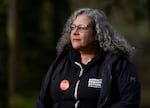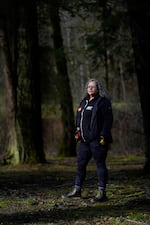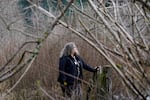Note: This story contains descriptions of domestic abuse. If you or someone you know may be a victim of domestic violence, contact the National Domestic Violence Hotline by calling or texting 800-799-7233.

“Water washes away the pain,” says Jennifer Langston, Dec. 31, 2024. Langston says that spending time in nature has helped with her emotional and mental recovery after she was shot through her chest by a boyfriend in 2014. Langston describes herself as a “two-time survivor of direct gun violence,” and has become a strong voice speaking out against domestic and gun violence.
Kristyna Wentz-Graff / OPB
In 2014, Jennifer Langston and her boyfriend were living in Missouri, trying to start a new life for themselves. They both had troubled pasts in Portland. Jennifer was the victim of an armed robbery in her apartment in 2006. Her boyfriend struggled with mental health issues and suicidal ideation. For a variety of reasons, Jennifer thought living in a small midwestern town with a college nearby would help both of them build a life.
It all fell apart in the early morning of April 1, 2014.
“All of a sudden, our bed is shaking, and I’m awake,” she says. “And the next thing I know, he shuts us both into our bedroom and puts his back against the door and begins to load and unload (his) gun. I am totally just, like, I don’t know what to do here.”
She says, “He raised the gun up and he fired.”
In America, stories of gun violence are heartbreakingly common. But the coverage tends to focus on those who died. Every year, tens of thousands of Americans are shot and have to figure out how to move on with their lives.
Jennifer Langston spoke with OPB about getting shot that day. This is her story, in her own words.

In this image provided by Langston, a bullet recovered after she was shot through her chest by a boyfriend in 2014. Langston describes herself as a “two-time survivor of direct gun violence,” and has become a strong voice speaking out against domestic and gun violence.
Courtesy of Jennifer Langston
How it happened
“I’m just thinking to myself, ‘Oh my gosh, how am I going to get out of this? I don’t know what to do.’ And all through this time, I’m speaking to him calmly and was like, ‘Hey, it’s going to be okay. We’re going to be okay.’
I did the thing that you’re not supposed to do in a domestic violence situation. I said, ‘I think we should break up.’ I knew well enough you should never say that. For some reason, I said that. And he came and sat down, and he was like, ‘Oh, you want to break up now?’ And then I’ll never forget this. He raised the gun up and he fired.
I was able to get up and turn and run. I was lucky. If I hadn’t gotten up and run, the bullet would’ve hit me in the heart. The bullet struck me in the arm and went through the middle of my body and broke my ribs, nicked an adrenal gland and ended up in my chest.”
How she saved herself
“I was able to say to him, ‘Our kids, what about our kids? Please don’t do this to our children.’ And he snapped out of it.
Now I had to ask him to save my life. I had to ask him to call the police. I had to convince him to call 911. I’m listening to him tell the 911 operator, ‘Yeah, my girlfriend’s been shot ... I shot her.’ And he was told to put the gun down. So he put the gun down next to me, emptied out all the bullets. So that was a relief.
Then I went onto the front porch, and I was left there alone, the most scared I’ve ever been in my life.”
What happened next
“This happened on April Fool’s Day, and I was back in Portland in June. The housing market was terrible. I didn’t have a job. I wasn’t healthy physically, mentally, or emotionally. So then I had to think about how am I going to survive. I decided I am going to probably have to go to a woman’s shelter and try and get some help because I’m not okay.
I had friends say, ‘Hey, here’s a room for you. You can come stay with us.’ And I’m like, that’s not going to work. I can’t control anything. I need complete control.
Then, I ended up at the Transition Projects shelter because the women’s domestic violence shelters were all full. And then I began to rebuild my life.”

“He was given 12 years. He served six," says Langston. "The heaviest charge he got was using a firearm in a crime."
Kristyna Wentz-Graff / OPB
What happened to her attacker
“He was given 12 years. He served six. The heaviest charge he got was using a firearm in a crime. This man tried to kill me. He didn’t get charged with that and only served six.
I thought that he would be stuck in Missouri to finish his parole, but they shipped him back to Oregon. He’s not allowed in Portland until his parole is up. But he lives in Tillamook County now.
I didn’t get a restraining order when he came back to Oregon because in the restraining order, he would know where I lived. Now, I live with a safety address. So if you look me up, you’re not going to find my home address. I just hope that he doesn’t find out where I live and I’m going to be protected.”
How she lives with the trauma
“Trauma shows up in the body as tension, constant tightness. I have to remind myself to relax the shoulder blades, relax the shoulders, relax your neck, remember to breathe. I think that’s my biggest issue is I constantly remind myself, don’t forget to breathe. And that’s something that just comes automatically, but I actually think about it.”
On how the shooting affects her relationships
“I don’t let anybody in my home. That’s my only safe place in this world. I don’t have people over. I don’t want people over. That’s probably not healthy. I have very few close friends I keep in contact with. If I’m in extreme PTSD, spinning out, afraid of my own self, I have one friend to call.
Most people don’t want to talk about this because it’s traumatizing. ‘Oh man, I’m going to cause so much sadness and trauma telling this story.’ And I’ve got to remind myself, don’t regulate people’s emotions. That’s for them to do."

Langston says she protects her home as her personal and private space since the shooting, and it's challenging for her to have relationships.
Kristyna Wentz-Graff / OPB
“It’s hard to have relationships. I can’t imagine entering into a boyfriend-girlfriend relationship. I have had a couple of relationships since this happened, and they always get to that point, ‘Are we going to move in together? Well, no, we’re not. It’s not safe for me mentally to move in with you, and it’s not going to be fun for you.’ So that’s really hard. I don’t see myself in a relationship ever again as far as living with another human being. I can’t see that.”
The reality of surviving
“I think that we need to be aware that there are going to be more and more survivors in this world. Every time I’ve ever spoken, somebody has come up to me and said, ‘Wow, I didn’t know I was a survivor. Thank you for telling your story. I didn’t think anybody understood.’
“It’s not very often that a person who has survived a gunshot gets the attention or the time to talk about what they’ve experienced and what they’re living with. It’s a reality that, unfortunately, until we figure out how to live with guns, we’re going to be experiencing more and more of.”
